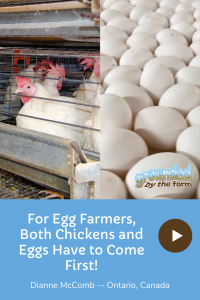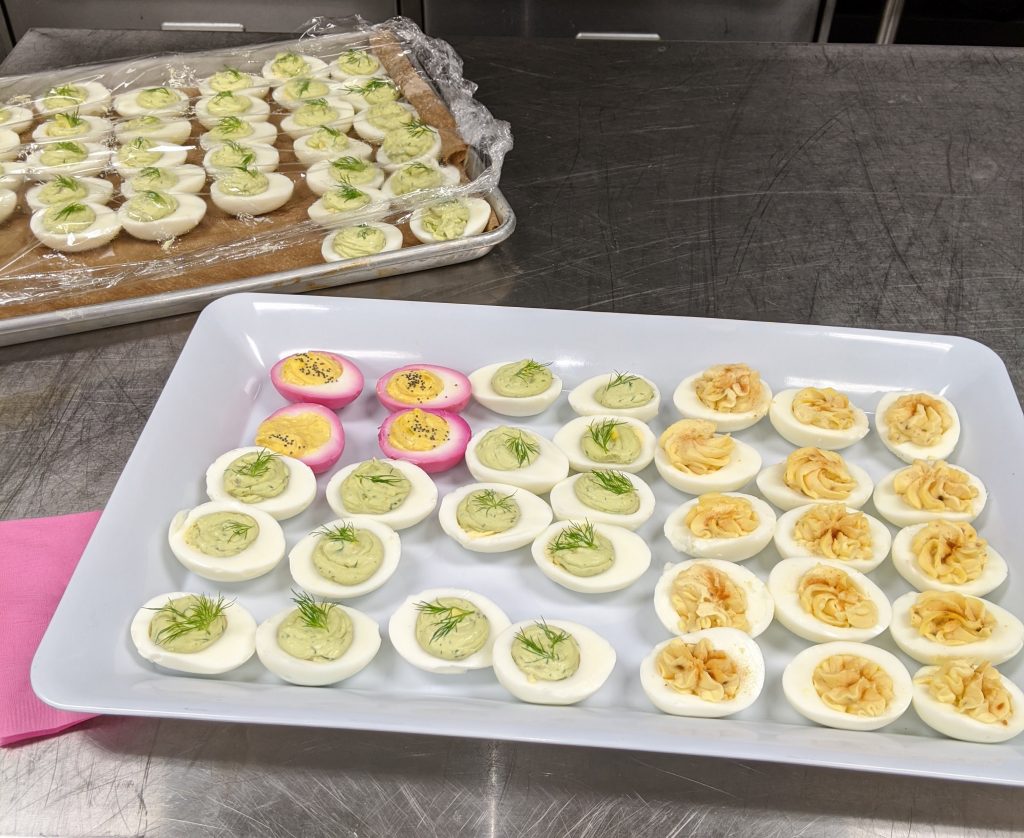 It’s the age ol’ question that continues to perplex us – which came first? The chicken or the egg? Most days, eggs are far more likely to be part of the breakfast mix than that may mean they come first for a lot of us. But for egg farmers like Dianne McComb it’s the care of hens that deliver the incredible, edible egg! So both stay front and center! (Podcast transcript available here — Talking with an Egg Farmer)
It’s the age ol’ question that continues to perplex us – which came first? The chicken or the egg? Most days, eggs are far more likely to be part of the breakfast mix than that may mean they come first for a lot of us. But for egg farmers like Dianne McComb it’s the care of hens that deliver the incredible, edible egg! So both stay front and center! (Podcast transcript available here — Talking with an Egg Farmer)
Getting to Know Dianne
McComb’s farm is in Ontario, Canada, just two short hours from downtown Detroit Michigan. She says the area still offers all the benefits of that country, rarified fresh air experience when it comes to growing resources and rearing livestock. The farm’s rolling hills are nestled in among other farms and small cities making for an excellent sense of community, interdependency and life that helps to foster the legacy she and now four generations have crafted.
Currently, Dianne and her brother operate the farm. They took it over from their parents a few years ago. And although Dianne’s children have chosen not continue on with the family farm legacy, the farm is in transition as new family of owners.
At 400 acres, her farm is average, and at one time featured beef cattle, crops and egg-laying hens at one time, but now eggs, corn, wheat and soybeans make up the main compliment of resources that Dianne and her farm provide. Believe it or not, the corn makes for an incredibly recyclable resource as they feed the egg-laying hens the grain to make them healthy and strong, then when the hens eliminate, their manure is used as a fertilizer to help make the corn (and wheat and soybeans) grow strong and fine, just like the hens and their tasty bounty!
Taking Care of the Hens
For some context, Dianne’s farm features 25,000 hens currently which make it an average-sized hen operation in Canada. When we compare it to the hen farms in the United States however, the number of hens increase to a million on average. That’s a lot of eggs!
What also comes with the hens, is the ongoing, evolving relationship of care. When you walk into the barn, they know you’re there and interact appropriately. In a smaller operation like Dianne’s, that’s incredibly valuable. That top level of animal care results in hen health, regular laying activity and standard of quality.
Although a backyard chicken coop may take a few minutes a day to take care of, a flock like the McCombs are more like a regular business day. After starting her day at 8 am, Dianne walks through tending to the hens needs, collecting eggs and the detailed cleaning needed to preserve biosecurity in her farm. She says most days, she’s done in the barn by 3:30 pm, which was especially nice when her kids were school aged. It’s a lot of work, but it’s truly a labor of love.
While the grind of a farm IS a daily activity, Dianne has a number of helping hands come in on the weekends to help round out all of the duties to take care of the farm. The housing system they used is called “enriched housing” for hens. Hens are inside all the time, have a perching area, a nesting area, and dedicated feed lines that run inside the living quarters. When the hens lay their eggs, they roll out onto a belt that collects them. Their manure is also managed to help keep both the hens and their general environment clear and healthy.
Dianne is active with a program called Farm & Food Care and pointed us to some videos that would help us see what the farm is like.
Focusing on the Eggs
What size egg does your household typically choose to buy? Do you know the differences there are in eggs? Dianne’s operation produces the “conventional white egg,” but there are MANY different types of eggs.
When you consider the average yield of a healthy egg-laying hen at Dianne’s farm, This one location produces upwards of 7.5 million eggs generated in a given year! While that is a high number, remember that these hens have been bred to provide the high-yields they offer and are being kept in great conditions by outstanding farmers! So much so that the hens themselves – have a NUTRITIONIST – while most of us don’t hire a nutritionist for our families even! The hens Dianne has on property are like little marathon runners who are healthy and doing what they need to do as they feed more people than ever!
One of the most-debated questions in the history of eggs is “can you leave eggs out, or NOT?” Well, the answer is it depends! So you’re going to have to listen to this episode to find out what the deal is!
Food safety concerns are always something vital to remember when it comes to hens and eggs. Did you know that it usually only takes 4 days from the time a hen lays an egg to their arrival on store shelves? While the process to get them there is detailed (and DISCO-Y), it’s needed to help provide the best eggs to customers. Grade A & Grade AA eggs are only sent to stores and the rest go to a range of uses including commercial kitchens.
View this post on Instagram
Perfect Boiled Eggs
Are you a fan of hard-boiled eggs? Most of the time people have issues peeling them – the reason? They’re TOO FRESH! The closer you get to the date final date listed on the crate of eggs , the easier it will be to peel the eggs!
Also remember that – if you’re looking to avoid the “dreaded green-ring” when making your own hard-boiled eggs, remember to cook, them but then to LEAVE THEM inside the hot water for 15-18 minutes after their initial cooking process.
Eggs are an easy, nutritious meal, that allows people both young and old to eat well and regularly! Eating good food in a small package.
No matter what your favorite kind of egg, no matter how much you know (or now know) about hens, there’s always more to learn! Be sure to share this episode of The Grounded By The Farm Podcast, to help us teach others about eggs, food reserves and the processes that help manufacture the world around us!
Links from The Editing Team
Fourth Generation Farmers are getting pretty rare! Connect with Dianne McComb on Twitter today to learn more about the legacy, the history and value of egg and Hen farming! https://twitter.com/dmmccomb
While Canada has been and continues to be one of the most-relationship-rich partnerships the US has ever had, few know the names of all of the Canadian provinces. Ready to remedy that with some quick memorization and learning? https://www.wikihow.com/Memorize-the-Canadian-Territories-and-Provinces#:~:text=Memorize%20the%20’bottom%20row’%20of,Nothing’%2C%20’Bart%20A
We love sharing photos of farms & food on the Grounded By The Farm Facebook presence and be sure to give us a “Like” and share our content! Our stories, legacies and learning can continue on with just a little help from you! https://www.facebook.com/GroundedbytheFarm
Check out the Grounded By The Farm Instagram presence and stay in touch with me as we make more great content during the year! https://www.instagram.com/groundedbythefarm_/?hl=en
DID YOU KNOW? Eggs that are produced in a country, are typically EATEN in that same country or even that area of the country!
You’ve likely experienced the results of an instituted “Pecking Order” in your life in one way or another. Did you know that Pecking Order finds it’s seed conversation when it comes to CHICKEN DOMINANCE? https://en.wikipedia.org/wiki/Pecking_order#:~:text=It%20was%20first%20described%20by,expression%20of%20dominance%20in%20chickens.
The Pecking Order for Hens struggle is REAL! Check out an outstanding video showcasing “HEN BULLYING!” It’s a real phenomenon and something you should learn more about! https://www.youtube.com/watch?v=hDacZOL0N-Q
While most commercial egg farms have one of three types of layers (hens that lay eggs) there are lots of different breeds of chickens that backyard farmers can choose from. Are YOU familiar with them? Learn all about the development and research that details the traits that make hens the most-efficient they can be! https://starmilling.com/poultry-chicken-breeds/
Eggs are not only a nutritious food, they are an easy-to-prepare food. Ready to learn 7 Great Ways to Prepare Eggs? https://www.nm.org/healthbeat/healthy-tips/nutrition/seven-ways-to-make-eggs




One comment on “For Egg Farmers, Both Chickens and Eggs Have to Come First!”